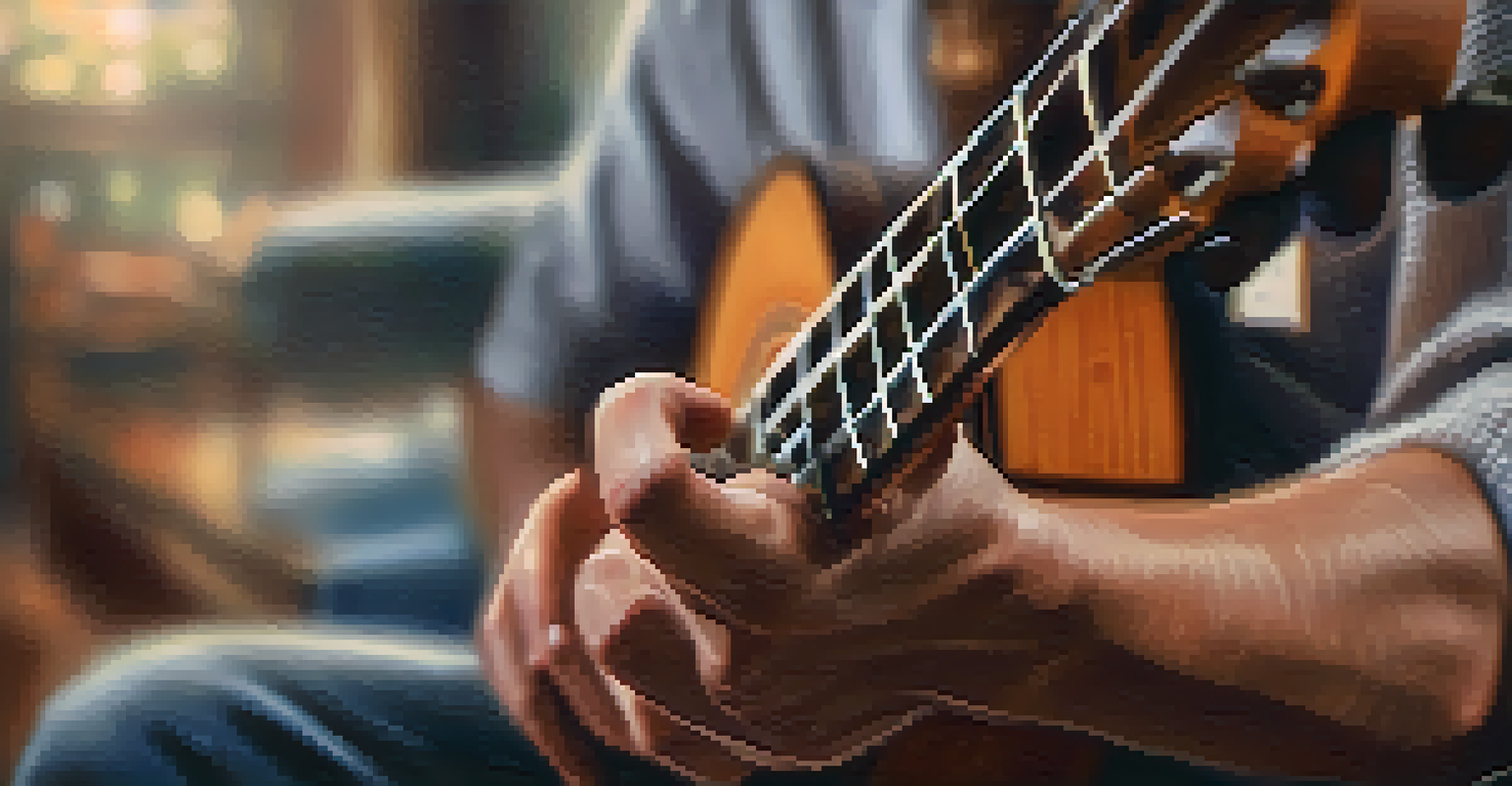Mindfulness and Ukulele: A Duo for Better Mental Health

Understanding Mindfulness and Its Benefits
Mindfulness is the practice of being present in the moment, fully engaging with your thoughts and feelings without judgment. This simple yet profound approach can lead to reduced stress, improved focus, and even better emotional regulation. It encourages a deeper connection with oneself, promoting a sense of peace and clarity that often feels elusive in our fast-paced lives.
Mindfulness is a way of befriending ourselves and our experience.
Research shows that mindfulness can significantly improve mental health by helping individuals manage anxiety and depression. When we practice being mindful, we retrain our brains to respond differently to stressors, allowing for healthier coping mechanisms. This shift in perspective can be incredibly empowering, fostering resilience and a more positive outlook on life.
Incorporating mindfulness into daily routines can be as easy as taking a few moments to breathe deeply or observe the world around you. The beauty of mindfulness lies in its accessibility—it can be practiced anywhere, anytime. This flexibility makes it a perfect ally for those looking to enhance their mental well-being.
The Ukulele: A Simple and Joyful Instrument
The ukulele, often associated with cheerful tunes and light-hearted vibes, is a fantastic instrument for anyone, regardless of musical background. Its four strings and compact size make it easy to pick up and start playing, resulting in a quick sense of accomplishment. This accessibility encourages people to explore their creativity and express themselves musically without the intimidation often felt with larger instruments.

Playing the ukulele can be a form of active mindfulness. When strumming chords or learning new songs, musicians immerse themselves in the moment, focusing entirely on their playing. This immersion can serve as a delightful escape from everyday worries, tapping into the therapeutic benefits of music.
Mindfulness Reduces Stress
Practicing mindfulness allows individuals to manage anxiety and depression, fostering resilience and a positive outlook.
Moreover, engaging with music has been linked to increased dopamine levels, which can boost mood and promote feelings of happiness. The combination of music and mindfulness can create a powerful synergy that enhances overall mental health, making the ukulele a fantastic tool for emotional well-being.
How Mindfulness Enhances Ukulele Playing
Integrating mindfulness into ukulele practice can elevate the experience from mere playing to a more profound form of expression. By adopting a mindful approach, players can focus on the sensations of playing—the feel of the strings, the sound of the notes, and the rhythm of their breath. This heightened awareness can deepen the emotional connection to the music, making each session more fulfilling.
Music can change the world because it can change people.
Mindfulness can also help musicians overcome performance anxiety. By centering themselves and focusing on the present, players can reduce distractions and engage more fully with their music. This practice allows them to enjoy the process rather than fixating on potential mistakes, fostering a more relaxed and enjoyable playing environment.
In essence, mindfulness transforms ukulele playing from a technical skill into an enriching experience. Whether strumming along to a favorite song or improvising, being present allows musicians to connect with their emotions and express themselves authentically.
The Synergy of Mindfulness and Music
Combining mindfulness and music creates a unique opportunity for personal growth and healing. When musicians engage mindfully with their instruments, they not only improve their skills but also nurture their mental well-being. This synergy allows for a holistic approach to self-care, where creativity and mindfulness support each other.
Research indicates that music can stimulate the brain in ways that enhance emotional regulation and cognitive function. When paired with mindfulness, these effects can be magnified, leading to deeper emotional insights and a greater sense of calm. This powerful duo encourages individuals to explore their feelings and thoughts in a safe and constructive manner.
Ukulele Playing Enhances Mindfulness
Engaging with the ukulele promotes active mindfulness, providing a joyful escape and tapping into the therapeutic benefits of music.
Ultimately, the intermingling of mindfulness and music can foster a greater appreciation for the present moment. Musicians find joy not just in the final performance but in every note they play, cultivating a sense of gratitude and mindfulness that extends beyond the music itself.
Practical Tips for Mindful Ukulele Practice
To get started with mindful ukulele practice, set aside specific time each day to focus solely on your playing. Create a quiet, comfortable space where you can concentrate without distractions. Before you begin, take a few moments to breathe deeply, allowing yourself to become centered and present for your practice session.
As you play, pay attention to the sensations you experience. Notice how the strings feel against your fingers, the vibrations of the instrument, and the sounds you create. If your mind starts to wander, gently guide your focus back to the music, embracing the journey of learning and self-expression.
Finally, try incorporating moments of silence into your practice. After playing a song or a section, pause and reflect on the experience. This mindfulness moment allows you to appreciate the progress you've made and the joy of creating music, enhancing the overall practice experience.
Community and Connection Through Music
Playing the ukulele can also foster a sense of community and connection, both of which are vital for mental health. Joining ukulele groups or attending workshops can introduce you to like-minded individuals who share a love for music and mindfulness. These social interactions can help combat feelings of isolation, providing support and camaraderie.
Collaborative music-making encourages teamwork and communication, enhancing social skills and building friendships. Being part of a musical community can inspire and motivate you to continue your mindfulness practice, creating a positive feedback loop that reinforces both your musical and mental health journey.
Community Builds Connection
Joining ukulele groups fosters community and connection, which are vital for mental health and can combat feelings of isolation.
Additionally, sharing music with others can be a profoundly rewarding experience. Whether performing in front of friends or jamming with fellow musicians, these moments create lasting memories and connections, reminding us of the power of music to bring people together.
Embracing the Mindful Ukulele Journey
Embarking on the journey of mindfulness and ukulele playing is not just about improving musical skills; it's about enhancing your overall mental health. As you explore this duo, you'll likely notice increased awareness, emotional expression, and a deeper connection to yourself and others. Each strum of the ukulele becomes a step towards greater well-being.
Remember, the goal is not perfection but rather enjoying the process. Allow yourself the freedom to make mistakes and learn from them. Embrace the joy of creating music mindfully, and you may find that it becomes a cherished part of your daily routine.

Ultimately, the blend of mindfulness and ukulele offers a beautiful way to nurture your mental health. By creating space for both practices in your life, you invite peace, creativity, and connection—essential ingredients for a fulfilling and balanced life.